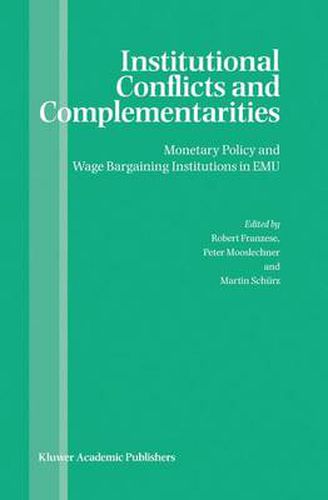Readings Newsletter
Become a Readings Member to make your shopping experience even easier.
Sign in or sign up for free!
You’re not far away from qualifying for FREE standard shipping within Australia
You’ve qualified for FREE standard shipping within Australia
The cart is loading…






This title is printed to order. This book may have been self-published. If so, we cannot guarantee the quality of the content. In the main most books will have gone through the editing process however some may not. We therefore suggest that you be aware of this before ordering this book. If in doubt check either the author or publisher’s details as we are unable to accept any returns unless they are faulty. Please contact us if you have any questions.
This important collection presents an authoritative selection of papers on Institutional Conflicts and Complementarities This publication is intent on building bridges between economics and the other social sciences. The focus is on the interaction between monetary policy and wage bargaining institutions in European Monetary Union (EMU). Institutional Conflicts and Complementarities is written by acknowledged experts in their field. The outcome is a broad analysis of the interactions of labour market actors and central banks. The volume addresses the recent changes in EMU. An important theoretical, empirical, and policy-relevant conclusion that emerges from Institutional Conflicts and Complementarities is that even perfectly credible monetary conservatism has long-term real effects, even in equilibrium models with fully rational expectations. The contributions to Institutional Conflicts and Complementarities identify linkages between wage bargaining institutions and central banks with a particular focus on EMU. We consider complementarities between institutions located in different areas of the political economy and ask: Can labour-market actors and independent central banks interact in mutually reinforcing ways? The analyses in Institutional Conflicts and Complementarities study critically the neutrality assumption under the conditions of institutional interactions in EMU.
$9.00 standard shipping within Australia
FREE standard shipping within Australia for orders over $100.00
Express & International shipping calculated at checkout
This title is printed to order. This book may have been self-published. If so, we cannot guarantee the quality of the content. In the main most books will have gone through the editing process however some may not. We therefore suggest that you be aware of this before ordering this book. If in doubt check either the author or publisher’s details as we are unable to accept any returns unless they are faulty. Please contact us if you have any questions.
This important collection presents an authoritative selection of papers on Institutional Conflicts and Complementarities This publication is intent on building bridges between economics and the other social sciences. The focus is on the interaction between monetary policy and wage bargaining institutions in European Monetary Union (EMU). Institutional Conflicts and Complementarities is written by acknowledged experts in their field. The outcome is a broad analysis of the interactions of labour market actors and central banks. The volume addresses the recent changes in EMU. An important theoretical, empirical, and policy-relevant conclusion that emerges from Institutional Conflicts and Complementarities is that even perfectly credible monetary conservatism has long-term real effects, even in equilibrium models with fully rational expectations. The contributions to Institutional Conflicts and Complementarities identify linkages between wage bargaining institutions and central banks with a particular focus on EMU. We consider complementarities between institutions located in different areas of the political economy and ask: Can labour-market actors and independent central banks interact in mutually reinforcing ways? The analyses in Institutional Conflicts and Complementarities study critically the neutrality assumption under the conditions of institutional interactions in EMU.